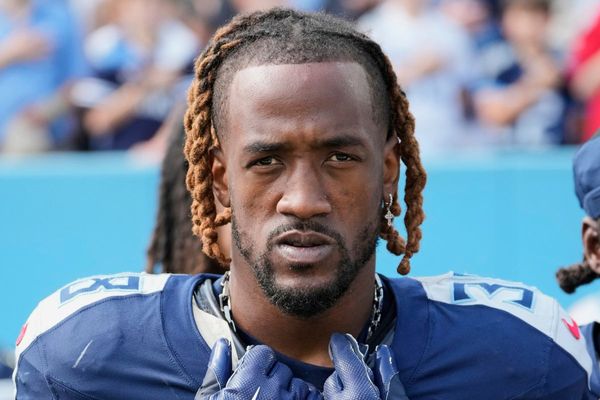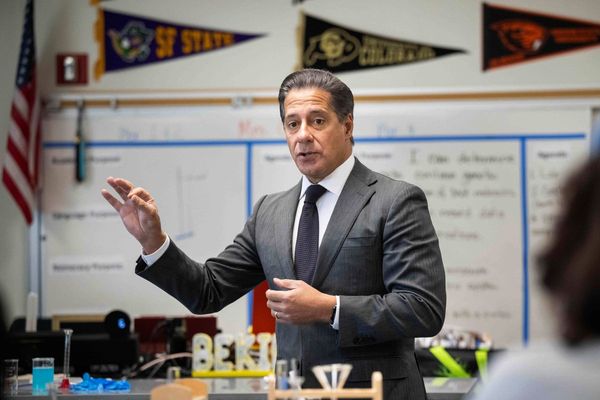
Sanhá João Correia is restless, walking around the boat and urging people to sit. He’s worried that a turn in the weather will mean a missed chance to cross the Geba River.
The agricultural engineer from the Guinea-Bissau NGO Tiniguena ensures everyone embarks promptly and the boat leaves Bissau, the country’s capital, loaded with drinking water, fuel and rice.
The crossing to Ilha Formosa, one of the Urok Islands in the Bijagós archipelago, takes four hours. It is home to a unique group of women, “the seed keepers” – farmers who are preserving the ancestral grains of the Bijagós.
The boat is the Cantoucha – the name of a respected seed keeper who died in 2021 – and is crewed by Bijagós sailors. “Only those who belong to the archipelago are allowed to navigate in these fierce waters,” Correia says. “To navigate safely you must ask permission from the gods.”

Correia and operational coordinator Emanuel Ramos are agroecological technicians in Urok, working with Tiniguena, and supporting the Women Keepers of Agricultural Biodiversity Seeds project, to conserve creole plants and their precious seeds.
The Bijagó ethnic group inhabit several islands of the archipelago, a Unesco biosphere reserve off the west African Atlantic coast. The Urok Islands have been designated a community marine protected area since 2005. About 3,000 people live there.
Creole seeds have been passed from generation to generation and are vital for the survival of the Bijagós. These are varieties and species, from corn to rice and peanut, that resist pests and the region’s fierce climate, which is getting more intense due to global heating.

The project has already trained more than 150 women in seed care, with 12 women elected as head seed keepers. Sábado Maio, 70, is one. She says storing seeds is a cultural task of Bijagós women.
“This is my work in nature. Women are the mother of everything, so women take care of the seeds more than men. Women are the ground, men are the sky. Women give birth, men don’t, so plants survive because of women.”
Born in the tabanka (village) of Canhabaque, on Ilha Formosa, her garden boasts 19 varieties of crops and a shady banana plant that bears ripening fruit. Maio is worried that the rains will soon destroy it. She says it has been raining more this season than last year – a recurring complaint in the islands.
Maio is in charge of the seeds including red-skinned yam, geneva yam, cassava, horse-corn and pumpkin. “I’m a keeper because I watched my grandparents do it. I know the importance of having seeds to ensure our way of survival,” she says. Even her language is now endangered: Bijagó is spoken only by the elders.

Two community adobe bembas (barns) have been built where 15 varieties of rice have been preserved and seeds are distributed to growers.
Anjuleta Gomes, president of the female horticulturists in the tabanka of Abu, has been keeping seeds since she was a child. “I would take them out, dry them, and protect them in jars,” she says. “I’m 44, and in 1993 I was the youngest female horticulturist. The community chose me.”
Under the palm thatch, protected from the relentless rain, Gomes is busy removing the chabéu, the palm tree fruit. “In the Bijagó tradition, the palm tree is everything,” says Gomes, “because you can use all its parts. Wine, oil, fruit, fish baskets, ropes, mats and ceilings are made from it.”

The barn is steps away from her house. “I save seeds of cherry tomatoes, pumpkin, okra, cucumber, eggplant, corn, rice, yam and lime.” Once dried in the sun, she explains, seeds are put in a dry jar. “You put some ash on it, to keep the bugs away, and close it well.” There’s a secret to preserving each type of seed, she says.
In Guinea-Bissau, as in many African countries, it’s mostly women who do the heavy labour on the land. In rural communities, women and girls ensure the water supply and household energy.
According to Tiniguena, less than 1% of these women own the land they cultivate, because of laws and customs that discriminate against them.
The Bijagós ethnic group represents 2% of the total population of Guinea-Bissau. Specific social roles are organised according to gender and age, with ceremonies as people move from one age group to another. Such celebrations had been under threat, as they involved foods and produce that were disappearing, replaced by cash crops such as cashew.

Since the beginning of the intervention in the Urok Islands, diversification of food production has helped hundreds of women and their families gain greater autonomy and strengthened female leadership, says Beatriz Lopes, a mother of nine and a celebrated cook in her tabanka.
As one of the oldest horticulturists on the island, she was part of the women’s group until 2018, when her health failed, but her garden still feeds 35 family members. “I have children studying in Bissau, but others, along with my grandchildren, help me produce tomatoes, cucumbers, okra, onions, carrots, cabbage, lettuce and kale.”
She saves seeds to distribute to other farmers. “I still manage to have enough to sell, buy rice, buy notebooks for the kids, pay for school, for medicine, and if I get sick we can go to the hospital.”

Esperança Correia, 45, is one of her husband’s four wives. She had no opportunity to go to school but started working on the land as a young girl. She now has four children and life is “a flip-flop”, she says, because “it demands looking for alternatives for survival all the time”. But as a seed keeper, she says she has more freedom, and she goes regularly to the Guinean capital, Bissau, to sell seeds.
In Abu, Maimuna Augusto, 47, keeps some tomato seeds stuck on the wall. They could be mistaken for dirty marks, but are precious. “Here, the seeds stay protected from bugs, too, as they are stuck into the clay so they do not reach it.”
For her, life has improved since the horticulturists have organised and shared knowledge. “I don’t depend on anyone and today my children can study more than I could, because I can help them.”

A 40-minute boat ride from Ilha Formosa is the island of Maio, where Sábado Madjo, 48, lives. A widow, she interrupts her work to tell us that she keeps “watermelon, manfafa, and yam genebra”. She started to store them as a game when she was a girl after watching her mother store seeds in improvised containers. “It is the garden that makes every woman valuable and this is our responsibility to provide for the future. My dream is to see my four children educated,” she says
A decade ago, Tiniguena first warned that the knowledge of the Bijagó society was in danger of being lost as cashew trees replaced palms, which were being destroyed for charcoal, and as garbage and other forms of environmental pollution appeared in the villages, loosening, the organisation said, “the ties of intimacy with the land”.
The climate crisis has made matters worse, warns Correia. “The Urok Islands are going to suffer with the rise of [the sea] and whatever happens to agriculture will first happen here.”
Seed keeper Sábado Luis lives in the tabanka of Chediã on Maio island and talks about the increasingly frequent and longer heavy rains. “When it rains, the water is not swept out to sea, it stays on the land, it floods everything and this is problematic for us, for our survival and food security.”

The growth of commercial cashew cultivation is a worry. “It is taking over our soil, because it destroys the land around it, taking all the resources nearby so we can’t produce anything else. The cashew root needs a lot of water and it only gives once a year and a few months. It is a waste of land.”
The 53-year-old mother of three keeps rice, beans and peanuts. For her, “natural resources are the survival of the Bijagós … We cannot give in to the pressure of commerce, we have to look out for the health of nature and resist the exploitation of resources, otherwise the Bijagó people have no future,” she says.
• Additional reporting by José António Abúdu
• This work was originally published in Azul, a supplement of the Publico newspaper in Portugal, and supported by independent scholarship by ACEP (Association for the Cooperation of the People) and CEsA (Centre for African and Development Studies)/ISEG (Lisbon School of Economics), with the support of Camões, IP







